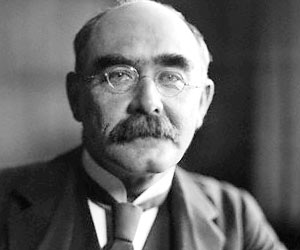The critic William Blackburn recognizes in Writers for Children the power of the work of Rudyard Kipling, “His unrelenting craftsmanship, his determination to be ‘master of the bricks and mortar of his trade,’ compels respect, and his genius as a storyteller, and especially as a teller of stories for children,” writes, “Although Kipling’s overall career still awaits judicious critical re-evaluation,” Blackburn concludes, “the general public—and especially the young public—has long since rendered its own verdict. His status as a writer for children is rightfully secure, and none of his major works has yet gone out of print.”
 Rudyard Kipling (1865-1936) was born in Bombay, but educated in England at the United Services College, Westward Ho, Bideford. In 1882 he returned to India, where he worked for Anglo-Indian newspapers. His literary career began with Departmental Ditties (1886), but subsequently he became chiefly known as a writer of short stories. A prolific writer, he achieved fame quickly. Kipling was the poet of the British Empire and its yeoman, the common soldier, whom he glorified in many of his works, in particular Plain Tales from the Hills (1888) and Soldiers Three (1888), collections of short stories with roughly and affectionately drawn soldier portraits. His Barrack Room Ballads (1892) were written for, as much as about, the common soldier. In 1894 appeared his Jungle Book, which became a children’s classic all over the world. Kim (1901), the story of Kimball O’Hara and his adventures in the Himalayas, is perhaps his most felicitous work. Other works include The Second Jungle Book (1895), The Seven Seas (1896), Captains Courageous (1897), The Day’s Work (1898), Stalky and Co. (1899), Just So Stories (1902), Trafficks and Discoveries (1904), Puck of Pook’s Hill (1906), Actions and Reactions (1909), Debits and Credits (1926), Thy Servant a Dog (1930), and Limits and Renewals (1932). During the First World War Kipling wrote some propaganda books. His collected poems appeared in 1933.
Rudyard Kipling (1865-1936) was born in Bombay, but educated in England at the United Services College, Westward Ho, Bideford. In 1882 he returned to India, where he worked for Anglo-Indian newspapers. His literary career began with Departmental Ditties (1886), but subsequently he became chiefly known as a writer of short stories. A prolific writer, he achieved fame quickly. Kipling was the poet of the British Empire and its yeoman, the common soldier, whom he glorified in many of his works, in particular Plain Tales from the Hills (1888) and Soldiers Three (1888), collections of short stories with roughly and affectionately drawn soldier portraits. His Barrack Room Ballads (1892) were written for, as much as about, the common soldier. In 1894 appeared his Jungle Book, which became a children’s classic all over the world. Kim (1901), the story of Kimball O’Hara and his adventures in the Himalayas, is perhaps his most felicitous work. Other works include The Second Jungle Book (1895), The Seven Seas (1896), Captains Courageous (1897), The Day’s Work (1898), Stalky and Co. (1899), Just So Stories (1902), Trafficks and Discoveries (1904), Puck of Pook’s Hill (1906), Actions and Reactions (1909), Debits and Credits (1926), Thy Servant a Dog (1930), and Limits and Renewals (1932). During the First World War Kipling wrote some propaganda books. His collected poems appeared in 1933.
Kipling was the recipient of many honorary degrees and other awards. In 1926 he received the Gold Medal of the Royal Society of Literature, which only Scott, Meredith, and Hardy had been awarded before him.
However, among the big amount of prizes he was awarded with, the most famous and relevant one is The Nobel Prize in Literature which was awarded with in 1907 “in consideration of the power of observation, originality of imagination, virility of ideas and remarkable talent for narration which characterize the creations of this world-famous author”.
The English author Rudyard Kipling is best known for his works: Just So Stories, The Jungle Book and “Gunga Din.” Indeed, The Jungle Book is now a good choice for the children reading assignment, as a few years ago when it was assembled as the kinds of reading competence. Through the reading of that story, not only grammar and orthography could be learned, but also a learning for life. As Rudyard Kipling said,
Words are, of course, the most powerful drug used by mankind.
After a few words so transcendental let pass to other enjoyable things in life, but no less important.
http://www.youtube.com/watch?v=vbf4weFbuS8
So, enjoy life’s good things, such as reading a nice book!
References:
- “Rudyard Kipling Biography”. In Bio. True Story. Retrieved 15th January 2014 from http://www.biography.com/people/rudyard-kipling-9365581
- “Rudyard Kipling – Biographical”. In Nobelprize.org. Retrieved 15th January 2014 from http://www.nobelprize.org/nobel_prizes/literature/laureates/1907/kipling-bio.HTML
- “Rudyard Kipling“. In The Poetry Foundation. Retrieved 15th January 2014 from http://www.poetryfoundation.org/bio/rudyard-kipling